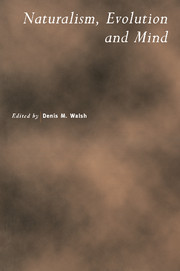Book contents
- Frontmatter
- Contents
- preface
- Notes on Contributors
- Editor's Introduction
- Mind the Adaptation
- Should Intentionality be Naturalized?
- Norms, History and the Mental
- What has Natural Information to do with Intentional Representation?
- Locke-ing onto Content
- The Evolution of Means-End Reasoning
- Rationality and Higher-Order Intentionality
- Theory of Mind in Non-Verbal Apes: conceptual issues and the critical experiments
- The Principle of Conservatism in Cognitive Ethology
- Domains, Brains and Evolution
- Evolution and the Human Mind: how far can we go?
- Index
Editor's Introduction
Published online by Cambridge University Press: 10 May 2010
- Frontmatter
- Contents
- preface
- Notes on Contributors
- Editor's Introduction
- Mind the Adaptation
- Should Intentionality be Naturalized?
- Norms, History and the Mental
- What has Natural Information to do with Intentional Representation?
- Locke-ing onto Content
- The Evolution of Means-End Reasoning
- Rationality and Higher-Order Intentionality
- Theory of Mind in Non-Verbal Apes: conceptual issues and the critical experiments
- The Principle of Conservatism in Cognitive Ethology
- Domains, Brains and Evolution
- Evolution and the Human Mind: how far can we go?
- Index
Summary
The papers collected in this volume are the proceedings of the 1999 Royal Institute of Philosophy conference: the theme of the conference, the same as the title of this collection, Naturalism, Evolution and Mind. The essays collected here cover a wide array of disparate themes in philosophy, psychology, evolutionary biology and the philosophy of science. They range in subject matter from the mind/body problem and the nature of philosophical naturalism, to the naturalization of psychological norms to the naturalization of phenomenal and intentional content, from the methodology cognitive ethology to issues in evolutionary psychology. They are united by the simple thought that the great promise of current naturalism in philosophy of mind resides in its potential to reveal mental phenomena as continuous with other phenomena of the natural world, particularly with other biological phenomena.
The study of the mind is undergoing something of a revolution. Advances in a number of disparate disciplines have given new impetus to the study of long-standing problems in the philosophy of mind. The essays collected in this volume give an overview of some of the ways in which developments in cognitive ethology, the philosophy of biology, evolutionary psychology, cognitive science and other fields have impacted upon the philosophy of mind.
- Type
- Chapter
- Information
- Naturalism, Evolution and Mind , pp. 1 - 22Publisher: Cambridge University PressPrint publication year: 2001



